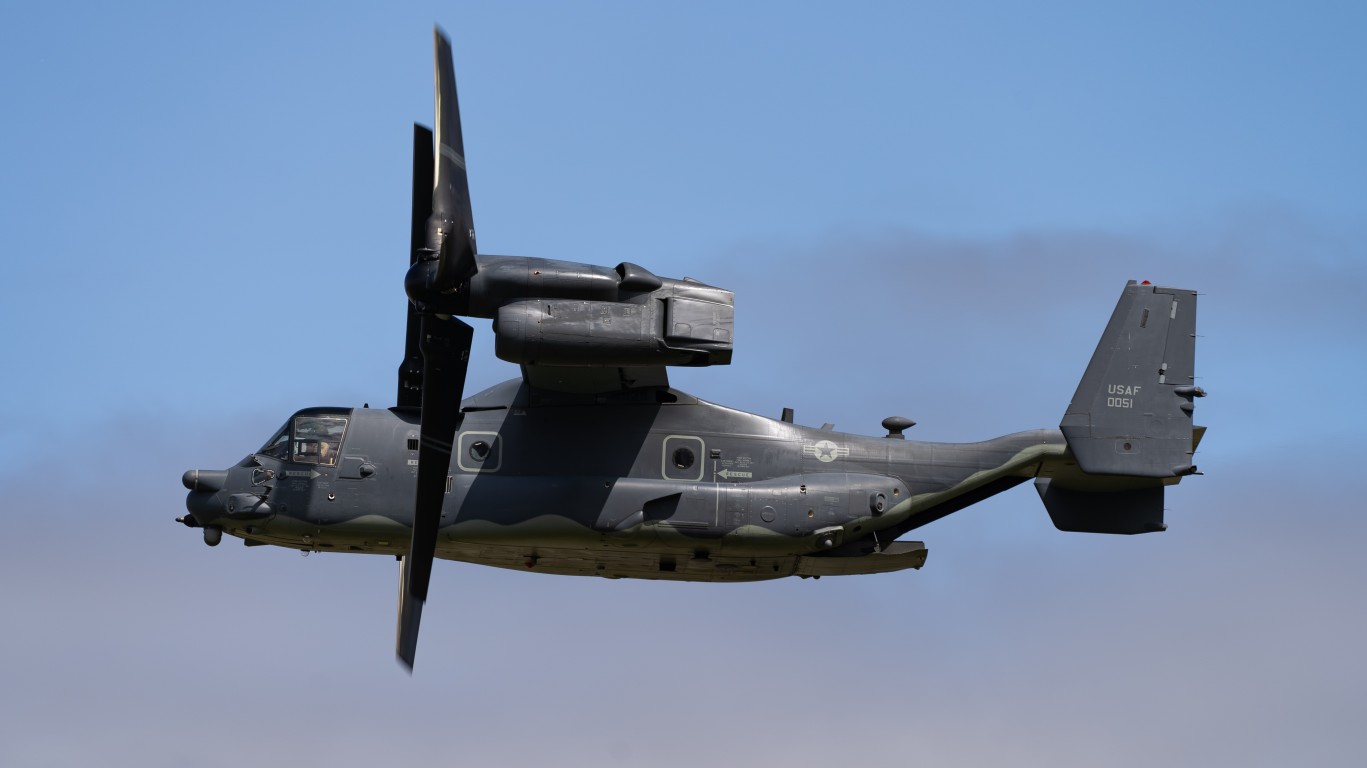
Lockheed Martin (NYSE: LMT) is one of the largest aerospace, arms, and defense companies in the world and an extremely large contractor with the United States and other governmental agencies. An American company, it was formed in 1995 and acts as a private company. Still, around 97% of the company’s income comes from the U.S. government, with 99% of sales coming from global governmental sales. Today, we are going to take a look at a few of the companies that exist in the same spaces that Lockheed Martin does that could classify them as a competitor.
It’s important to know that a company as large as Lockheed Martin has divisions across many sectors. From satellite to cyber, and even to tanks and missiles, Lockheed Martin invests a lot and, therefore, has a lot of competition. To determine our list, 24/7 Wall Street looked at similar companies that occupy the same sectors as Lockheed Martin or companies that directly compete with a major arm of Lockheed Martin’s operations. Let’s get started.
1. Raytheon
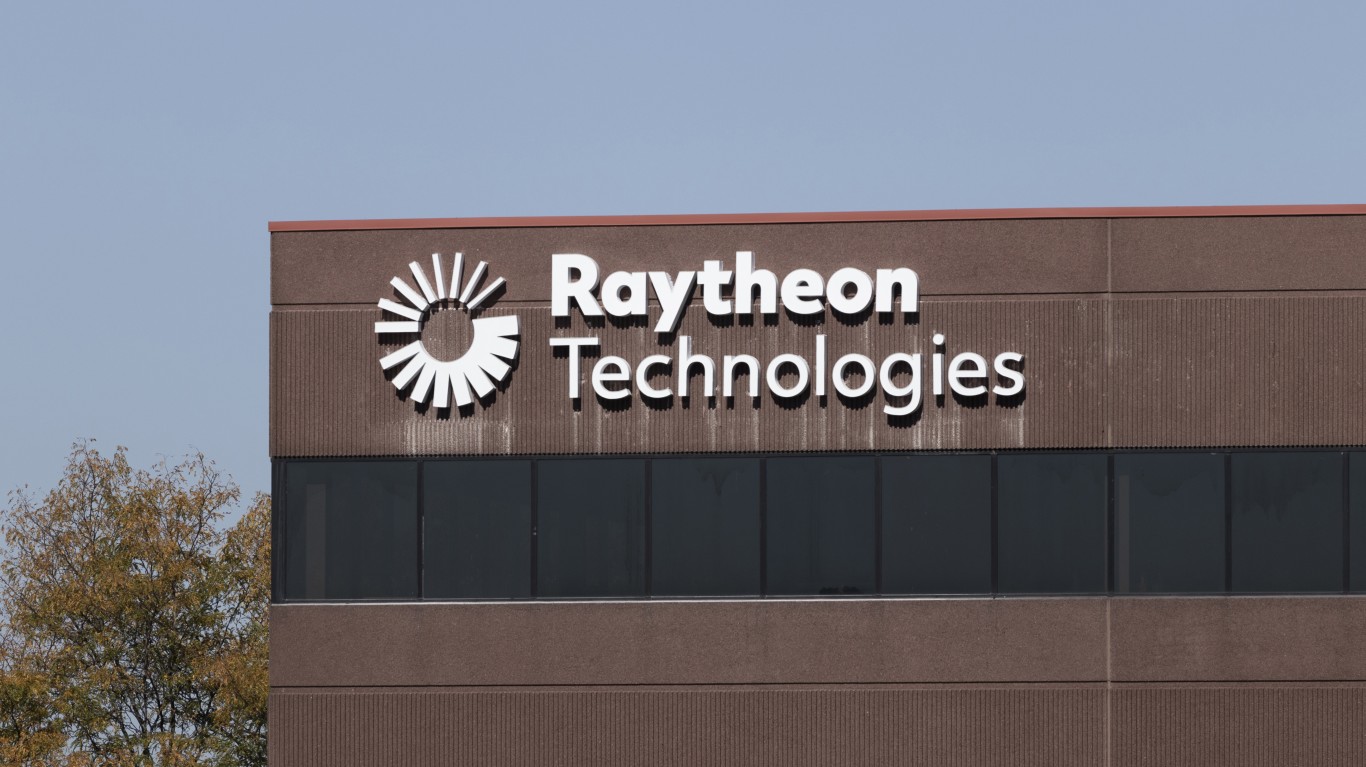
Few organizations have the scope that Lockheed Martin does, but Raytheon (NYSE: RTX) definitely comes close. Both companies invest heavily in aircraft engines, avionics, aerostructures, cybersecurity, missiles, air defense systems, satellites, and a whole lot more.
Additionally, like Lockheed Martin, Raytheon is primarily a government contractor and works mostly with the United States. Both organizations are also similar in size, with a market cap of around $110 billion. They also have headquarters in similar locations, with Raytheon’s HQ being located in Arlington, Virginia, and Lockheed Martin’s headquarters in Bethesda, Maryland (both near Washington DC).
Both companies are constantly fighting in similar spaces and provide similar technologies, although they both have specialties. Raytheon is especially good at creating sensors and missiles, while Lockheed Martin focuses on missiles and aircraft.
2. Boeing
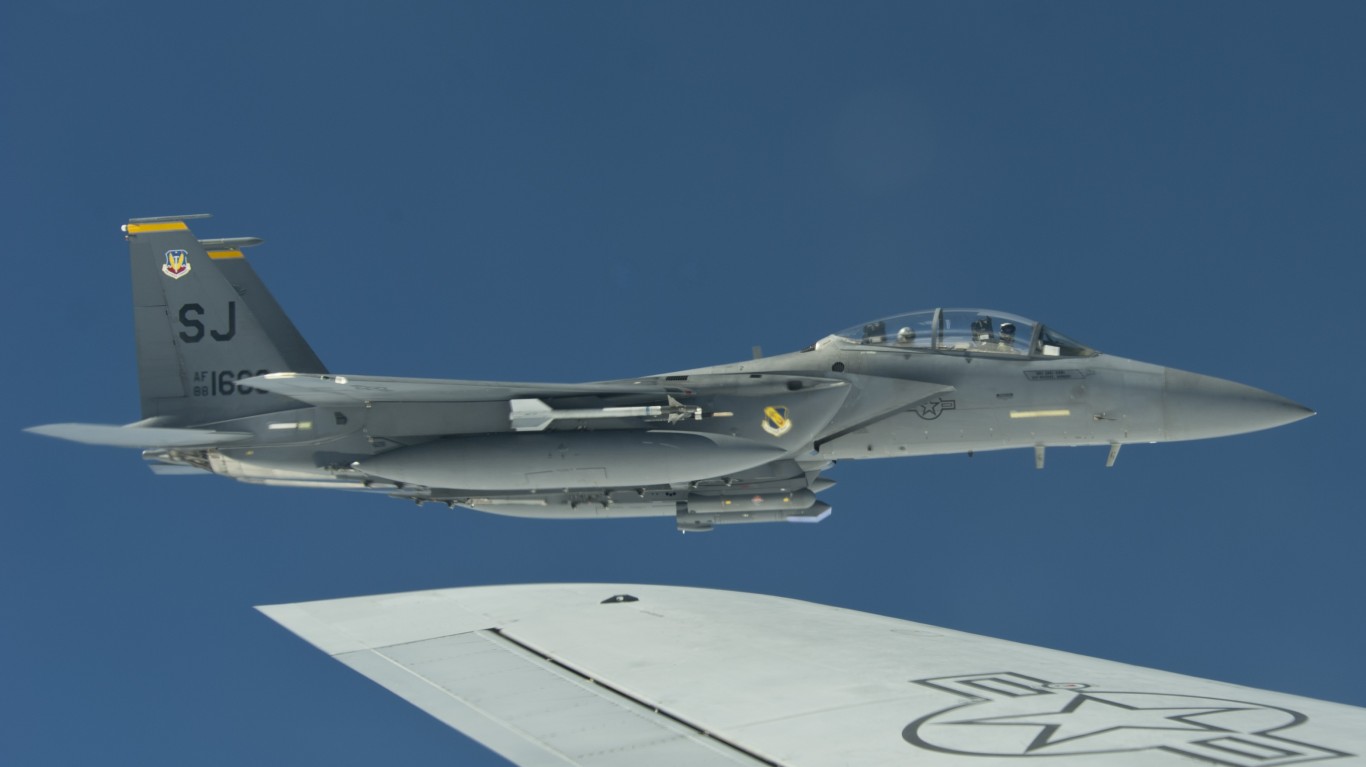
Boeing (NYSE: BA) stands as another formidable competitor to Lockheed Martin and directly competes with them in the aircraft and defense sectors. Boeing is easily one of the world’s leading aerospace companies and has extensive government contracting, directly mirroring Lockheed Martin’s primary revenue stream.
Similar to Lockheed Martin, Boeing has a broad portfolio that covers things like commercial airplanes, military aircraft, satellites, and defense systems. Their rivalry intensifies in areas such as missile defense, space exploration (a more recent development), and military aircraft development. In some instances, however, the companies will work together to create bids against other organizations, as was the case in the Sikorsky/Boeing bid for the U.S. Army’s Future Long-Range Assault Aircraft contract.
Boeing’s headquarters in Chicago, Illinois, not all that near Washington DC or Lockheed Martin. With Boeing’s market cap exceeding $140 billion, the company currently has a higher market cap than Lockheed Martin.
3. BAE Systems
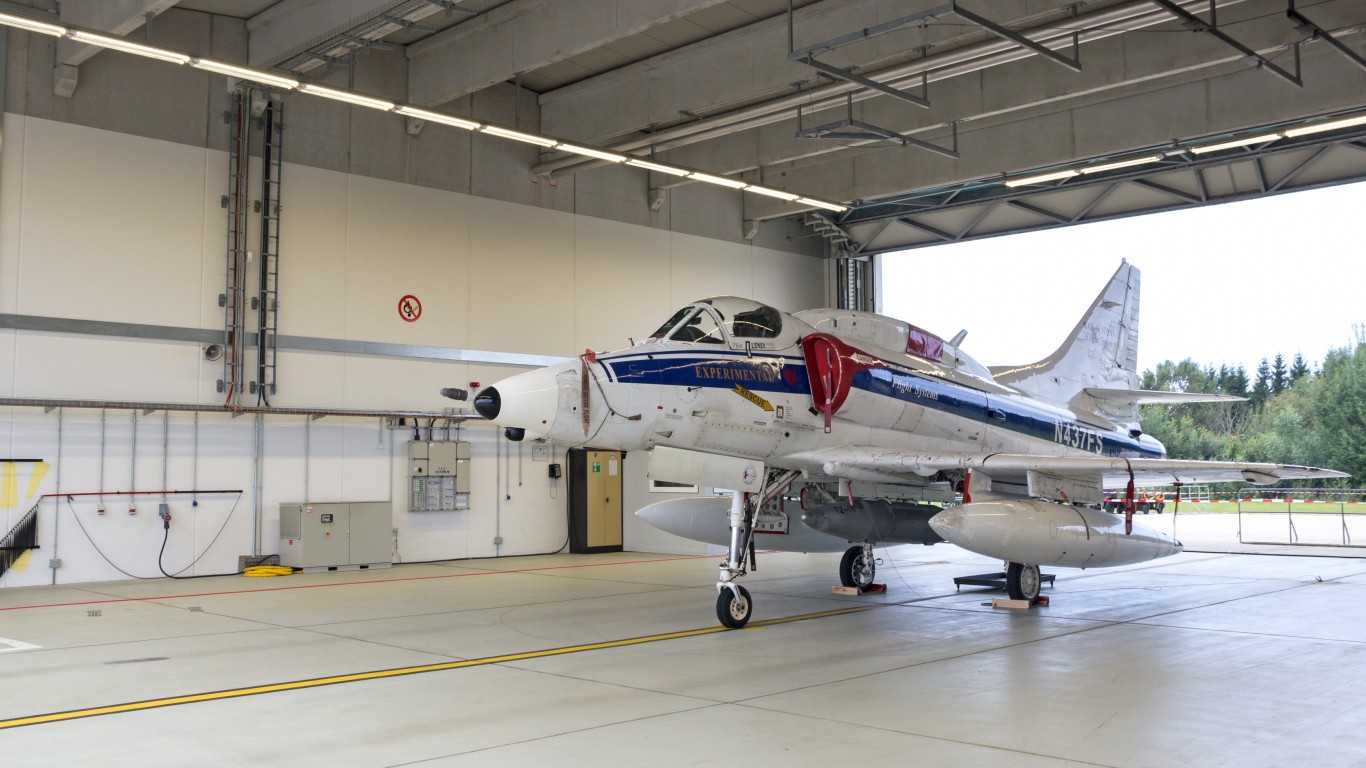
BAE Systems (OTCMKTS: BAESY) is a global defense and aerospace company. Again, it stands as a significant competitor across the same realms as Lockheed Martin. The company’s portfolio spans land, air, and naval systems, many of which are in defense capacities.
Much like Lockheed Martin’s multinational operations, BAE Systems is an international giant, serving customers worldwide. The company’s focus on advanced electronics, cyber capabilities, and intelligence systems positions. While Lockheed Martin does do deals with other countries, they are primarily focused on the United States. BAE is much more diversified when it comes to the countries that it deals with.
4. General Dynamics
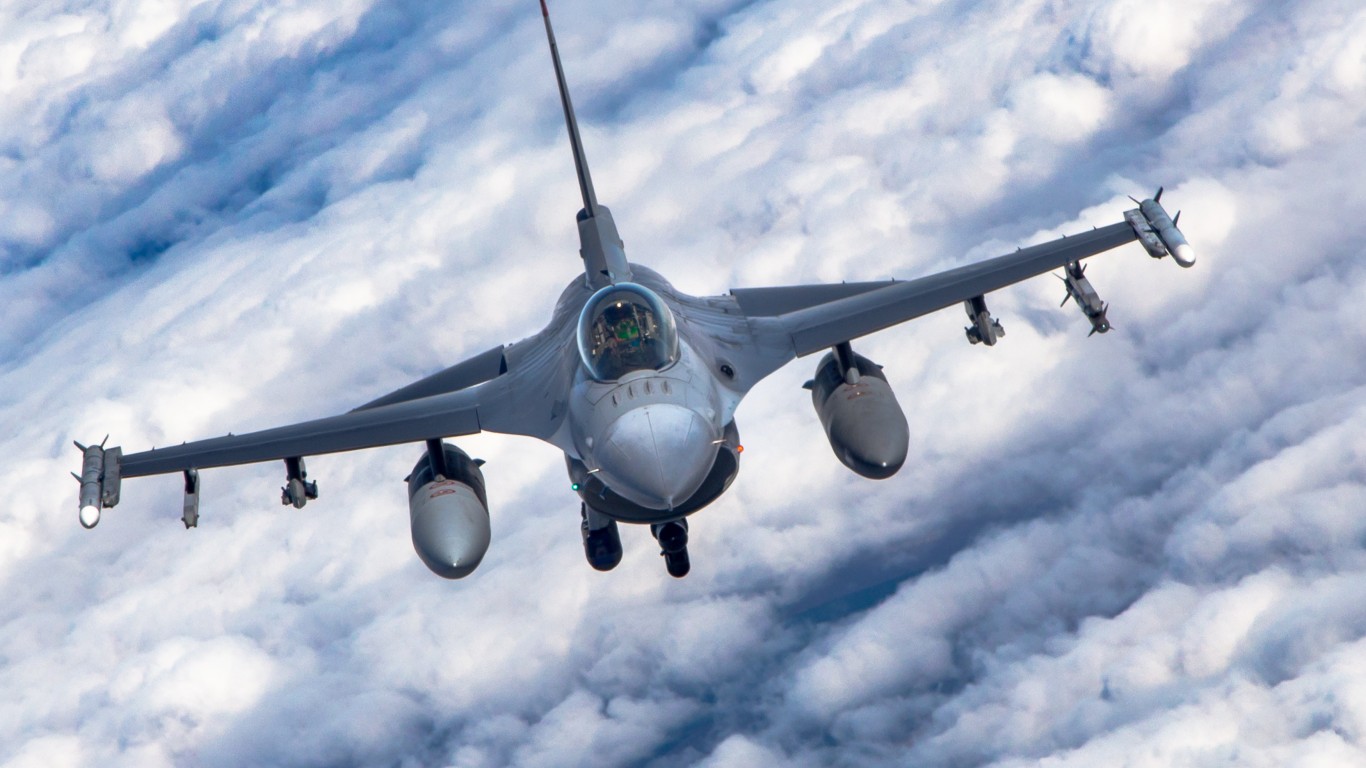
As the fifth-largest defense contractor globally in terms of arms sales and ranking similarly in the United States by total sales, General Dynamics (NYSE: GD)is a key player in the industry.
General Dynamics is a major government contractor with specialties in land systems, maritime solutions, aerospace, and information technology, aligning closely with Lockheed Martin’s offerings.
General Dynamics focuses on armored vehicles, naval systems, and IT services, many things that Lockheed Martin also addresses. In terms of geographical proximity, General Dynamics’ headquarters in Reston, Virginia, place it right near Washington, D.C.
5. Northrop Grumman
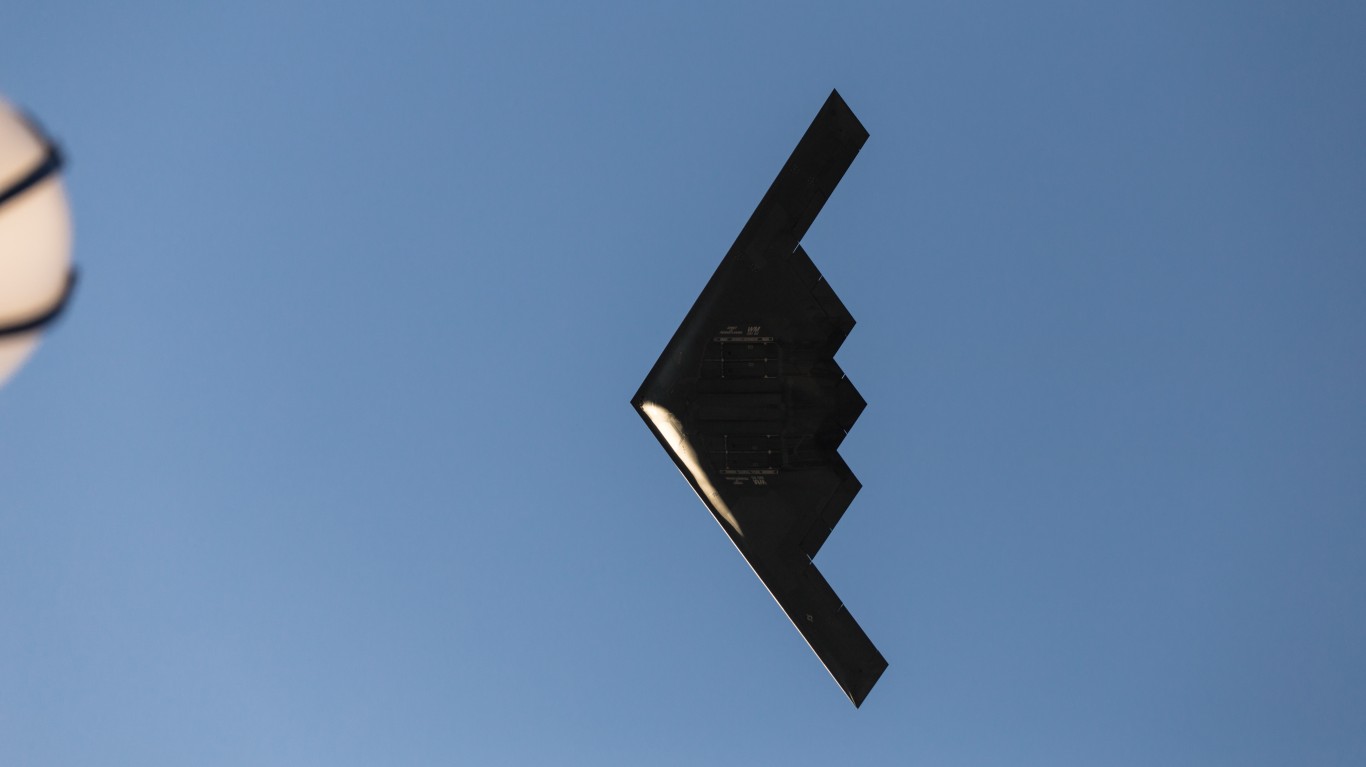
Another of the big, recognizable names on the list is Northrop Grumman (NYSE: NOC). Northrop Grumman is another key player in the aerospace and defense sectors. They specialize in naval systems but also deal in intelligence solutions with the DoD and other international allies.
Similar to Lockheed Martin, Northrop Grumman is deeply built on government contracts, the majority of which are with the United States Department of Defense. In terms of market capitalization, Northrop Grumman ranks among the giants. The company’s headquarters is in Falls Church, Virginia.
6. Airbus
Airbus is a more direct competitor to a specific branch of Lockheed Martin’s offerings: aviation. While primarily known as a major player in the commercial aviation industry, Airbus does step the realm of defense and military aerospace, making it a competitor for Lockheed Martin in some instances.
It’s important to note that Airbus isn’t an American company, but a European multinational aerospace corporation. Unlike Lockheed Martin, which is deeply rooted in the U.S. defense landscape, Airbus operates on a global scale. This type of presence adds a distinct dynamic to the competition.
In terms of capabilities, Lockheed Martin often focuses on advanced missile systems and fighter jets, while Airbus brings more specific offerings to the table, usually in the form of military transport aircraft, helicopters, and satellite systems.
7. Bell Textron
Bell Textron, a subsidiary of Textron Inc. (NYSE: TXT), stands out as a distinctive competitor to Lockheed Martin, particularly in the realm of military helicopters and vertical lift aircraft. Unlike Lockheed Martin, which covers a broad spectrum of defense sectors, Bell Textron specializes in a very specific branch of aerospace.
Headquartered in Fort Worth, Texas, Bell Textron has a sharp focus on rotorcraft that helps to set it apart from Lockheed Martin’s broader portfolio. This focused rivalry between Lockheed Martin and Bell Textron is notable, especially in areas such as utility and attack helicopters. Lockheed Martin, with its emphasis on fixed-wing aircraft and missile systems, encounters a direct and specialized competition from Bell Textron in the domain of vertical lift platforms.
A recent contract, for example, was awarded to Bell Textron for a new generation of aircraft for a few branches of the United States military. The contract was in contention between a few companies, being narrowed down to Lockheed Martin and Bell Textron. Only recently was it announced that Bell Textron would earn the contract.
8. L3Harris Technologies

L3Harris Technologies (NYSE: LHX) was once a more broadly focused competitor to Lockheed Martin, but recent changes have had the company refocus on more specific technologies (although they are still a direct competitor). L3Harris is probably most known for its surveillance solutions, microwave weaponry, and electronic warfare. They are headquartered in Melbourne, Florida, however, pretty far away from DC than other contractors prefer to be.
In a recent strategic move, L3Harris announced the selloff of their Commercial Aviation Solutions Business to TJC for $800 million. This decision indicates a shift in focus, allowing L3Harris to streamline its operations, but it still competes with Lockheed Martin in many areas.
While the selloff signifies a strategic business decision, L3Harris still maintains a competitive edge against Lockheed Martin, albeit primarily in a different sector. Lockheed Martin has similar ventures into adjacent technologies, including Directed Energy and Laser Weapons.
It’s Your Money, Your Future—Own It (sponsor)
Retirement can be daunting, but it doesn’t need to be.
Imagine having an expert in your corner to help you with your financial goals. Someone to help you determine if you’re ahead, behind, or right on track. With SmartAsset, that’s not just a dream—it’s reality. This free tool connects you with pre-screened financial advisors who work in your best interests. It’s quick, it’s easy, so take the leap today and start planning smarter!
Don’t waste another minute; get started right here and help your retirement dreams become a retirement reality.
Thank you for reading! Have some feedback for us?
Contact the 24/7 Wall St. editorial team.

